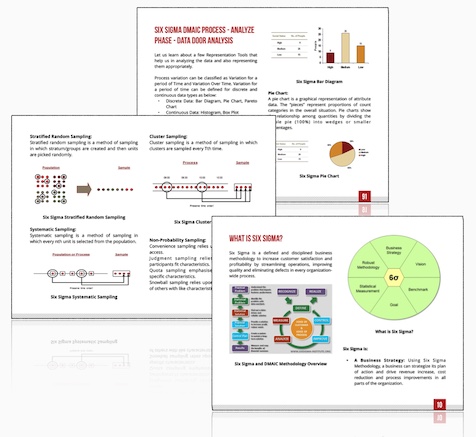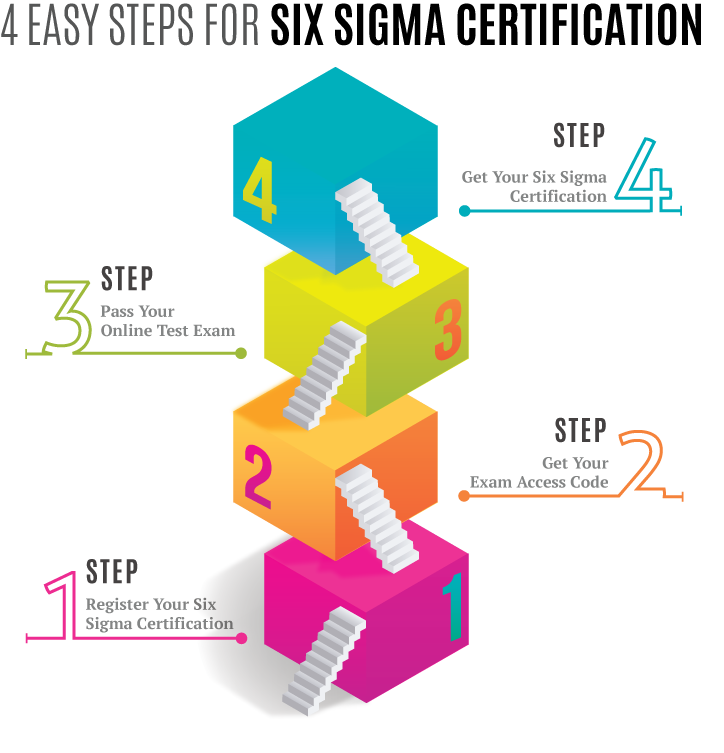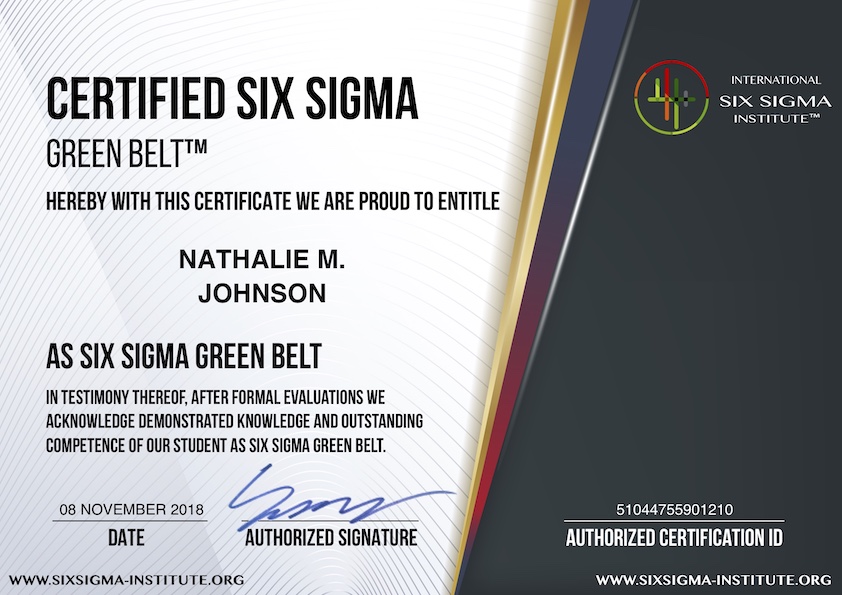12 Technological Forces that Shape Your Future - Real and already Emerging
International Six Sigma Institute™
17 September 2023
Your Future with Technology
Technological Forces
Technological Trends
You are moving from the world of fixed nouns towards a world of fluid verbs. Within the next years you will continue taking solid things -such as a car or a jacket- and turning them into intangible verbs. Your products are becoming your services and processes. With high doses of built-in technology, your car is becoming a service, continuously updated set of benefits adapting to your own usage and feedback, fierce competition and global innovation.
In this article inspired from The Inevitable by Kevin Kelly we will present for you 12 forces that shape your future.
Bear in mind that these forces are trajectories, but not exact destinies. They offer no predictions of where you arrive. They only tell you that you are inevitably headed in their directions. Here we go:
1. BECOMING
Behind the scenes, your machines are upgrading themselves, slowly changing their benefits and features they serve for you. This happens gradually, so you don’t notice they are “becoming”. You are extending your current perspective to the future, which in fact distorts the new to fit into what you already know. This is why the first movies were filmed like theatrical plays and the first virtual realities shot like movies.
Any promising new invention has its naysayers, and the bigger the promises, the louder the nays. Remember smart people saying stupid things during the birth of internet/web. In 1994 Time magazine explained why internet would never go mainstream: “It wasn’t designed for doing commerce”. They haven’t seen that internet wasn’t designed to do and to be anything, but it is “becoming” whatever it is you want internet to become. Here is the thing. In terms of internet, nothing has happened yet. It is still at the beginning of its beginning. It is only “becoming”.
The greybeards in 2050 will tell you: Can you imagine how awesome it would have been to be an innovator or entrepreneur in 2016? Opportunities were wide-open and you could pick almost any category and add some artificial intelligence, put it on the cloud. The last 30 years created an excellent starting point and a solid platform to build great things. But what’s coming will be different, other and beyond. Today truly is a wide-open frontier. It is the best time ever in human history to begin. You are not late.
2. COGNIFYING
There is nothing as influential as a dumb tool made smarter. Even a tiny amount of useful intelligence built into an existing process boosts its effectiveness to a whole new level. Three generations ago, your ancestors took a thing and made an electric version. Now everything formerly electrified you will cognify. There is almost nothing you can think of that you cannot make new, different and more valuable by infusing it with some extra IQ. It is easy to forecast the business plan of thousands of emerging start-ups: Take X and add Artificial Intelligence. Find something that you can make better by adding online smartness to it.
Most of the commercial work served by Artificial Intelligence will be non-human special purpose programs. Drive a car, but do know your work routines. Recall every pixel on every youtube video, but do not translate. They will be nerdy narrow, but supersmart specialists. You are for inventing new kind of intelligences that biology could not evolve. Your job is to build machines that think different.
Your animal body does not possess the excellent degree of control, attention and precision. Therefore, the greatest benefits of robots and automation come from their abilities you are unable to do. Remember, you can’t make a single computer chip inside your computer in front of you, but the robots you built can. The only reason you buy an handmade cloth today is because you love the imperfections humans introduce.
The highest earning professions in the next decades will depend on automations and machines that you have not invented yet. You couldn’t have imagined self driving cars couple of decades ago, but you are working hard to built them today. So don’t worry. Robots will neither enslave you nor they will take your job. Robots will create jobs that you did not even know you wanted done. Your human job is to continue making jobs for robots. You will never finish this task, you will always have at least this one job.
3. FLOWING
The flow of copies is inevitable. This is why the first version of a new medium imitates the medium it replaces. The first commercial computers employed office metaphor. Your screens had desktops, folders and files. Second age of computers were organised based on the principles of the web. The basic unit was no longer files, but hyperlinked pages accessible from built-in browsers. Now you are entering into the third age. Files, pages and browsers lost their significance. Your prime units are flows and streams.
You expect everything to operate in real time. If you purchase something with your credit card, you want your transaction to immediately appear on your card statement. If you want to watch a movie, you want watch it now. If you text someone, you want a response now, not tomorrow. In order to operate in real time, everything has to flow. Your companies do their utmost to increase their efficiency and productivity. This is no longer enough today. Now your companies need to save their customers time.
When nighttime electrical lightning was new and scarce, it was the poor who burned candles. When the electricity became easily accessible, your preference flipped and candles on your dinner table became a luxury. When copies are superabundant, they became worthless. Instead, stuff that can’t be copied become scarce and valuable. Now you are asking what can’t be really copied.
Immediacy: Your hard cover books command a premium for their immediacy, disguised as a harder cover. Beta versions of your apps and software possess a sense of immediacy.
Personalisation: A concert recording to sound acoustically perfect in your particular living room. Custom edited books by the publishers to reflect your own previous reading background.
Interpretation: You can make your living by selling instructions and paid support for free software. When a copy costs nothing, the interpretation of what it means, what you can do about it, and how to use it will be expensive.
Authenticity: You might locate and download a popular commercial software for free, but you can’t make sure it is bug free and without malware. You pay for an authentic copy to get the same free software but with an intangible peace of mind.
Accessibility: Ownership often sucks. You have to keep your things tidy and up-to-date. Most of the material are available free, but it is not comfortable to deal with them. With a paid service you have access to free material anywhere.
Embodiment: At its core a digital copy is without body. It is sometimes luxurious to have the same words printed on bright white cottony bound in leather. You pay for tickets to attend a event in person that is also streamed live for free. Many musicians earn their living today through concerts, not music sales.
Patronage: Deep down, avid audiences and you as a fan want to pay creators. You pay, when it is extremely easy to do, when the amount is reasonable, when there is a clear benefit to them for paying and when it is clear the money will directly benefit the creators.
Discoverability: No matter what its price is, a work has no value unless it is seen. Fans use many ways and pay for it to discover worthy works out of the billions produced. TV Guide had a million subscribers and it made more money than all three major TV networks it guided combined.
Flowing starts fixed and rare. Precious products take time and expertise to create. Then they become free and ubiquitous. Afterwards these products become steam of services which are shared among you and many others. Finally, the status of creation is inverted, and the audience is now the new artist. Have you noticed how easy today to compose music or make movies? This is because they are flowing.
4. SCREENING
Links and tags of the web might be two of the most important inventions during the last 50 years. You are anonymously making the web smarter each time you link or tag something. You will be able to generate a social graph of an idea and a timeline of a concept, or a networked map of influence. You will come to understand that no information is a standalone island, they are parts and related entities, past and present.
You will begin to write books to be read as snippets or to be remixed as pages to become the whole and an ever-growing universal library which is greater than its parts. Your works on the margin of popularity will find a small audience larger than the near zero audience they usually have now. Your grasp of history and your sight to possibilities for the future will deepen, as every original information in the course of civilisation is scanned and cross-linked. On a particular subject, you will have better understanding what we as a species, as a civilisation, do and don’t know.
You started putting watchable screens on any flat surface. You will be screening anything in real time. Eiffel Tower in Paris could be visible while one stands in front of Eiffel Tower via a wearable screen such as Google Glass. You will be screening and interacting with universal library with your whole body and mind.
5. ACCESSING
Your possessions are no longer as important as they were once. Accessing is more important than ever. Digital technology and web accelerate the dematerialisation from your old products to your new services. When Amazon launched Kindle E-Book Reader back in 2007, Jeff Bezos claimed that this wasn’t a product, this was a service selling access to a reading material. Access is now a way you deliver new things in close to real time. And of course they should be cheaper.
If smartly connected, a crowd of amateurs can be as good as the average solo professional. The benefits of existing products can be unbundled and remixed in unexpected and delightful ways. If smartly connected, products melt into services that can be continuously accessed. Long term trend in our modern lives is that most goods and services will be short term use. Therefore, most goods and services are candidates for rental and sharing.
You build platforms to become foundations to let others build products and services on them. Ecosystem is a good description for these platforms. Just as in a forest, the success of one species (service) depends on the success of others. It is this deep ecological interdependence of a platform which discourages ownership and promotes access. Unlike traditional two-sided markets where buyers and sellers transact, your platform became a multisided market now.
Dematerialisation, decentralisation and massive communication are leading you to build even more platforms. Platforms are factories for services and services favour access over ownership. And remember: The majority of what you do on the web and phone is done on cloud computing. Although they are invisible, clouds run our digital lives.
6. SHARING
Online public has an incredible willingness to share. When individuals work together toward a large goal, it produces astonishingly superb results. You don’t have to shoot another photo of Eiffel Tower, since the community can most probably provide a better one than you can take yourself. Sites like Reddit or Twitter steer public conversations more than newspapers or TV networks do. Organised results can create results beyond ad hoc cooperation can. Linux, Apache, 3D Warehouse, Raspberry Pi are only a few examples to name those.
But what about creators? How will their creative acts will be financed? No method has been as beneficial to creators as crowdfunding. Let’s turn your fans into chief marketers. Once they become motivated, they will ensure your goal by recruiting their friends to your campaign. Lending platforms such as Kiva, Prosper and Lending Club achieve more than 99% payback rate. Traditional finance can only dream about this. And for the users, this is a powerful encouragement to lend again and again. Even innovation itself are crowdsourced by major big Fortune 500 companies.
Your companies dream to graduate from making products to creating sharing platforms. Once you will achieve this, then you will need to act more like governments than companies in keeping opportunities flat and equally reachable, and hierarchy to a minimum. The power of sharing is not about nonprofit sector. The earliest version of Google overtook leading search engines by employing the links made by amateur creators of web pages. Each time you made a hyperlink on the web, Google calculated that link as a vote of confidence for the linked page.
The unarticulated, but intuitively understood goal of sharing is: To maximise both the autonomy of the individual and the power of people working together. There is a large list of subjects that experts once believed we modern humans would not share. But it turns out that with the right technology, with the right benefits in the right conditions, we will share everything. There must be a million more and new ways to share unexpected things in unexpected ways.
7. FILTERING
It would consume more than a year’s worth of your attention to preview all the new things that have been invented and created during the last 24 hours. You use all types of filtering to narrow down the stunning spread of options. Gatekeepers such as parents, authorities, intermediates such as publishers, music labels, curators such as stores, museums, libraries, brands, governments, cultures, friends serve us as filters. You also make choices based on our own preferences. Funnily, but traditionally for most of us own preferences is the rarest filter we use.
Amazon makes a good job for filtering. They label it differently, but they offer you things you didn’t know “based on your own purchase history and the purchase history of the ones similar to you”. The danger of being rewarded with only what you already like is that you may spin into a spiral, becoming blind to anything slightly different, even you would love it. So you may want to invent a filter like this: “people who disliked those, learnt to like this one”. Heavily cognified and smart filters will be applied to any domain with a lot of choices. Anywhere you want personalisation, filtering will follow. The most trivial product or service could be personalised if you want it. In the next years, you will be filtering entire web and cloud, elevating the degree of personalisation.
Companies are making money from your attention. TV networks make 20 cents per hour you watch TV, Newspapers make 93 cents per hours you read, Books make 534 cents per hour you read and Internet make 360 cents per hour you use it. Internet is the only medium among those which seems to be future-proof. Remember these rates are the mirror of how much you, as the audience, value your attention. You have not yet explored all possible ways to exchange and manage attention and influence. Getting paid for your attention and influence are still unborn. You may want to compose user-generated ads. The ads that actually created sales would be kept and shared. As an influencer you can be compensated and share the profit of sales. Those ads that weren’t effective would be dropped. Users like you would become ad agencies, as you have become everything else.
During the last 140 years commodity prices are reducing about 1% per year. The only things that are increasing in cost while everything else heads to zero are human experiences which cannot be copied. Everything else becomes commoditised and filterable. Not coincidentally, humans excel at creating and consuming experiences. This is no place for robots. That’s where you spend out money and that’s where you make your money. You will use technology to produce commodities, and you will consume and build experiences in order to avoid to become a commodity yourself.
8. REMIXING
Real sustainable economic growth does not usually stem from new resources but from existing resources that are rearranged to make them more valuable. Growth comes from remixing. In fact, anything digital will have undo and rewindability as well as remixing.
Two (Integrators and Original Mixers) of three major personalities to invent anything new can only function with the power of remixing.
Architects: They build something from scratch. Example: Elon Musk’s Tesla which designs, builds, markets and sells automobiles with absolutely new and unconventional techniques and technologies.
Integrators: They remix proven tactics. They usually move one idea from industry and adapt it to another. Example: Spotify’s flat rate music streaming inspired from flat rate telecommunications subscriptions.
Original Mixers: They believe in the power of purple cows to get attention. Example: “Breakin`Mozart” group which mix Mozart’s classical music taste with break dance.
The more powerful the invention and creation, the more likely and more important it is that it will be transformed and remixed by others.
9. INTERACTING
You will soon click to a training room where an instructor will walk you through a class and guiding your avatar through the learning procedures. “See this? Now you do this.” In many ways, the AR (Augmented Reality) classes will be superior to real world classes. The tiny camera eyes that now stare back at you from any screen will be trained with additional skills to better sense and understand you, so that you will receive even more personalised service from servers in the cloud.
The dumbest object you can imagine today can be vastly improved by outfitting them with some sensors and making them interactive. A person mumbling to herself while her hands dance in front of her will be the signal in the future that she is interacting with a device and service. Moreover, the next obvious step for computers is to lay against our skin. You call those “wearables”. Your body is your password. Your digital identity is you.
10. TRACKING
We are opaque to ourselves and need all the help we can get to decipher who we are. The design of the internet of everything, and the nature of the cloud that it floats in, is to track data. Anything touching this cloud that is able to be tracked will be tracked.
Ubiquitous surveillance is inevitable. Since we cannot stop the system from tracking, we can only make the relationships more symmetrical. There is a one-to-one relationship between personalisation and transparency. Greater personalisation for you requires greater transparency. Absolute personalisation requires absolute transparency.
If you prefer to remain private and opaque to potential friends and institutions, then you must accept that you will be treated generically, without regard to your specific particulars. You can have your privacy, but you will be an average number. This is why majority of technologists argue that like all trace elements, anonymity should never be eliminated completely, but it should be kept as close to zero as possible to ensure utmost possible personalisation and highest standards of services.
During the last couple of decades, entirely new industries emerged based on the idea of unbundling. The music industry was overturned by technological companies that enabled melodies to be unbundled from songs and sounds unbundled from albums. Remember, revolutionary iTunes sells single songs, not albums.
11. QUESTIONING
Only questioning will make things possible, which once used to be or seemed to be impossible. If we would have thought about Wikipedia 20 years ago, most of us had believed that an aggregation of random contributions would have been a total mess. However, Wikipedia managed to lead us toward a appreciation of social power. We are now much more interested in both the power of the collective and the new obligations stemming from individuals toward the collective.
Therefore, the impossible will feel inevitable. The gap between questions and answers is our ignorance, and it is growing exponentially. In other words, science is a method that chiefly expends our ignorance rather than our knowledge. If you think about search engine technology, despite those 100 billion-plus searches for answers per year (in USA alone), no one would have believed 30 years ago that there was an $82 billion business in answering people’s questions for free.
Answers become cheap and questions become valuable - the inverse of the situation now. Pablo Picasso brilliantly anticipated this invention in 1964 when he told: “Computers are useless. They only give you answers”. This is why today the majority of expensive big data projects do horribly miss their business cases. You can’t get a useful answer if you don’t ask appropriate questions.
The technologies of generating answers will continue to be essential, so much that answers will become omnipresent, instant, reliable, and just about free. But the technologies that help generate questions will be valued more. Question makers will be seen as the engines that generate the new fields, new industries, new brands, new possibilities, new continents that our restless species can explore. Your questions are simply more powerful than your answers.
12. BEGINNING
This is the first time when you and the inhabitants of this planet linked together into one very large thing (internet). Later this very large thing would become even larger, but you are alive at the moment when it first awoke and emerged.
Artificial Intelligence don’t get so smart that they enslave us, rather AI, robots, filtering, tracking and all other technological forces outlined in this article coverage -humans plus machines- and together we move to a complex interdependence.
Future people will envy you, you began animating inert objects with tiny bits of intelligence, weaving them into a cloud of machine intelligences and then linking billions of minds into this single supermind. This convergence will be recognised as the largest, most complex, and the most surprising event on the planet up until this time.
And you are one of the main actresses / actors to make this a reality.
|
Share this Article with Your Friends and Colleagues!
|
|

|

|

|

|
|
 SIXSIGMA INSTITUTE™
SIXSIGMA INSTITUTE™













